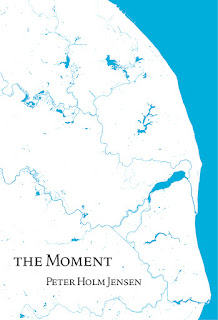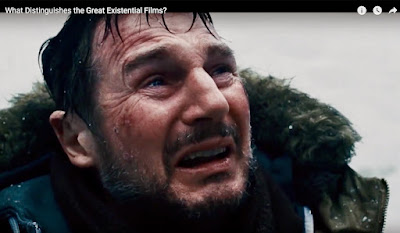If such things matter, and they don't, my book of the year is Peter Holm Jensen’s The Moment. As I wrote in April, it’s one in which the writer seeks “a modest, self-effacing place within the intersection of time and eternity” and can be read again and again for this reason, as one's deepest concerns, otherwise diluted by public pantomimes, take form in the patience of attention. To recognise this again is always a surprise.
Before and after such recognition, I'm often confused by how much Karl Ove Knausgaard’s writing
stirs me, embarrassed even, because his books are unremarkable in many ways (the public ways); not
remotely what others misunderstand as modernist or, that horrible word, experimental. But I can't deny the same recognition, and it's the intersection taking form in the otherwise straightforward narrative that explains my response to The Morning Star, which stands out among the novels I've read this year.
Time is a constraint on two other of my books of the year: Gabriel Josipovici's 100 Days, the result of a plan to write 100 essays in the 100 days of the first lockdown of 2020 (reaching 83 in the end), on subjects prompted by each letter of the alphabet, and Ellis Sharp's Twenty-Twenty, which presents itself as an autofictional chronicle of each day of the year, following Uwe Johnson's Anniversaries from which 'Ellis' quotes in the early months of the year. Apart from the calendar constraint, the two couldn't be more different: one "deceptively slight, disarmingly circumstantial...a joy to read" as Ben Hutchinson says in his review, the other bitter, unforgiving, bordering on monomaniacal.
They do have one more thing in common: opinions which will upset or confound many. A key understanding of Josipovici's work in general comes when he asks "Why does my heart leap when I see a sculpture (Giacometti) or a painting (Bonnard, Hammershøi) of a figure in a closed room?" And answers that what they have in common is the depiction of limits. He cites other works by Beckett, Sterne, Stravinsky and Stockhausen that affect him in the same way:
So that my equally visceral dislike of the piano music of Schumann and Chopin and the symphonies of Mahler may be explained by the feeling they evoke in me that they are trying to lull my spirits rather than awaken them. And the same with so many novels and realistic paintings and sculptures. But also with abstract art like Pollock’s and Rothko’s, however different they may be, and with purely OULIPIan creations like the novels of Harry Mathews.
What moves me then is the depiction of the outside world, of human beings, which at the same time recognises that it is depiction and not ‘life itself’ and is prepared to press hard to see how far that brings freedom and how far enslavement.
By coincidence, Twenty-Twenty begins with an epigram in which a prisoner in darkness touches the wall of his cell so that "his fingers may tell him what his eyes cannot", which happens to be from Josipovici's 1996 book Touch. So rather than art being, as is commonly presented and understood, a brief and illusory release from the closed room, it is for both in their own way, an enquiry into the possibility of freedom. In Ellis Sharp's case, it is freedom from the prison of British political and cultural life in which local escapism is fine but political possibility is not, hence the culture's elevation of middlebrow epigones to greatness, while those in the great tradition of dissent and art are marginalised. In an entry for February the first, Ellis is reading Ian McEwan's Guardian article on Brexit which, Ellis says, "oozed with the complacency of the globetrotting liberal intellectual". Later, he reads John le Carré's speech accepting the Olof Palme Prize: "Another smug, narcisstic writer, Ellis thought":
'Palme loved being the irritant. Relished it. Relished being the outsider voice,' Le Carré remarked, adding 'And now and then, I have to say, it does the same for me.' David Cornwell an outsider? St Andrew's Preparatory School, Sherborne School and Lincoln College, Oxford. And what could be more banal and conformist than Cornwell's politics? Dutiful mention of North Korea, ISIS, Iran, Russia, China and talk of nuclear threats but complete silence about Israel's armoury, Egypt, Saudi Arabia, events in Yemen. A dutiful assault on 'Jeremy Corbyn's Labour Party' which, had it been elected, would have meant David Cornwell paying a great deal more in tax. The usual generalised reference to Labour anti-Semitism without a shred of evidence. Agreeable reflections about his privileged life as a globetrotter. No mention of carbon footprints or climate catastrophe. A fabulously wealthy old man and potboiler king wallowing in self-satisfaction.
There are 400 more pages like this. It reminds me of Journey to the End of Night when Bardamu says "Every virtue has its own indecent literature". We need more of such indecency in virtuous English literary culture.
Le Carré of course was a prominent signatory of this letter saying he couldn't vote for Corbyn's Labour party because it would be "to surrender in the fight against anti-Jewish prejudice". Note the other signatories and see if you can find any complaints from them about who runs the party now and its treatment of its Jewish members like Diana Neslen and Riva Joffe:
 |
| Click on the image to see the tweet |
Look at the names again and you'll notice what else they have in common, which brings me to my final book of the year: Didier Eribon's Returning to Reims, a sociological yet often hair-raising memoir of how his sexuality alienated him from the working-class family and community in which he grew up, and how that background alienated him from the privileged intellectual community he moved into. It was published in translation several years ago but I read it alongside Cynthia Cruz's The Melancholia of Class and Catherine Liu's Virtue Hoarders, both published this year. The former is a study of artists who also move away from their working-class backgrounds to find success but find the past casts a long shadow (including Jason Molina, whose songs are also part of Emil's playlist for The Morning Star), the latter an analysis of the class who sign such letters to the Guardian.
What stood out for me in Eribon's book was his account of the "vast offensive" begun in France "to facilitate an organized shift to the right of the politico-intellectual field". Eribon's career at Libération, the daily newspaper founded with the support of Sartre and Foucault, came to end as a result. This process has been happening to the British left, becoming blatant and successful after the election of Jeremy Corbyn, and is something Ellis Sharp reflects in his extensive quotation of dissent from regular civilians and independent journalists using social media and websites, which has been relatively free from this offensive, but now appears to be facing a similar threat. Eribon's memories of his family's Communism are especially poignant in this regard, as he says of his mother: "her dreams in life were not of becoming rich, but rather of light and of freedom". When I read the names of those who signed such letters and promoted the scam, I see them smashing lightbulbs and slamming prison doors. I hope one day they recognise what suffering and injustice they have enabled. As it is, these books are only small cracks in the wall my fingers found in 2021.









